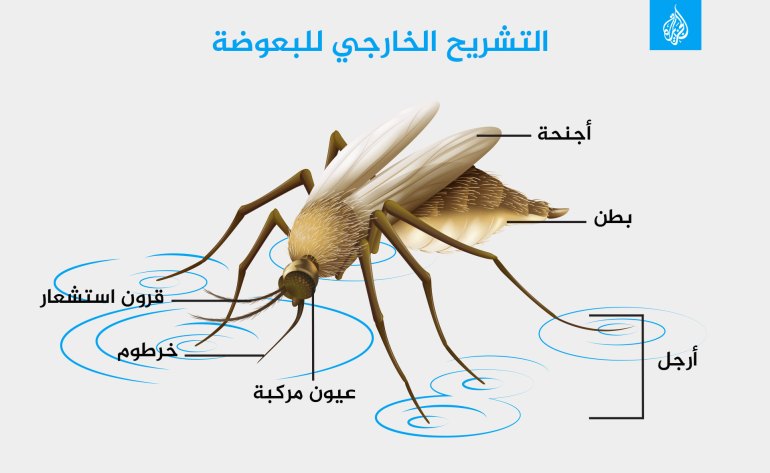Have you ever wondered what is the secret behind the amazing ability of mosquitoes to reach humans?
Researchers have studied the subject and found the mechanism behind the ability of mosquitoes to smell humans.
Humans release an aromatic mixture of body odor, heat and carbon dioxide, which varies from person to person, and through which mosquitoes determine their next destination.
While most animals have a specific set of neurons that detect each type of odor, mosquitoes can pick up odors via several different pathways, as the study published in the scientific journal Cell suggests. British.
odor coding
"We found that there was a real difference in the way mosquitoes encode the odors they encounter, compared to what we learned from other animals," said Meg Younger, assistant professor of biology at Boston University, one of the study's lead authors.
Researchers at Rockefeller University in New York were baffled when mosquitoes were still somehow able to find people to bite, after removing an entire family of human scent-sensing proteins from their genome.
The team then examined scent receptors in the mosquito's antennae, which bind to chemicals that float in the environment and send signals to the brain via neurons.
We hypothesized that only one type of receptor would be expressed in each mosquito neuron, but instead, we saw that different receptors could respond to different odors in the same neuron, Younger said.
Capture human odors
This means that the loss of one or more receptors does not affect the mosquito's ability to pick up human odors.
Understanding how the mosquito brain processes human scent can be used to interfere with biting behavior and reduce the spread of mosquito-borne diseases such as malaria, dengue and yellow fever, the researchers said.
Mosquito-borne diseases, according to the US Centers for Disease Control and Prevention, include:
Zika virus.
West Nile virus.
Chikungunya virus.
Dengue fever.
Mosquitoes not only carry human diseases, but they can also transmit many diseases and parasites that dogs and horses are most susceptible to.
These include: dog heart worms, eastern equine encephalitis and West Nile virus, according to the US Environmental Protection Agency.
Different species of mosquitoes prefer different types of standing water to lay their eggs in, and the presence of beneficial predators — such as fish and dragonfly nymphs — in permanent ponds, lakes and streams helps keep these bodies of water relatively free of mosquitoes.
However, parts of the swamps, clogged ditches and ponds are all mosquito breeding sites.
Among the sites where some types of mosquitoes lay their eggs:
tree holes.
old tires.
buckets.
the games.
trays.
Even small places like bottle caps.
To control mosquito populations and help prevent the spread of diseases that they can carry, you should:
Remove mosquito habitat.
Use of mosquito repellents (mosquito repellents) to protect against the diseases it transmits.

